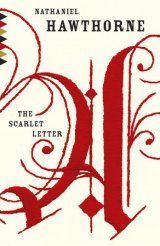The Scarlet Letter Page #8
First published in 1850, The Scarlet Letter is Nathaniel Hawthorne's masterpiece and one of the greatest American novels. Its themes of sin, guilt, and redemption, woven through a story of adultery in the early days of the Massachusetts Colony, are revealed with remarkable psychological penetration and understanding of the human heart.
No longer seeking nor caring that my name should be blasoned abroad on title-pages, I smiled to think that it had now another kind of vogue. The Custom-House marker imprinted it, with a stencil and black paint, on pepper-bags, and baskets of anatto, and cigar-boxes, and bales of all kinds of dutiable merchandise, in testimony that these commodities had paid the impost, and gone regularly through the office. Borne on such queer vehicle of fame, a knowledge of my existence, so far as a name conveys it, was carried where it had never been before, and, I hope, will never go again. But the past was not dead. Once in a great while, the thoughts that had seemed so vital and so active, yet had been put to rest so quietly, revived again. One of the most remarkable occasions, when the habit of bygone days awoke in me, was that which brings it within the law of literary propriety to offer the public the sketch which I am now writing. In the second storey of the Custom-House there is a large room, in which the brick-work and naked rafters have never been covered with panelling and plaster. The edifice--originally projected on a scale adapted to the old commercial enterprise of the port, and with an idea of subsequent prosperity destined never to be realized--contains far more space than its occupants know what to do with. This airy hall, therefore, over the Collector's apartments, remains unfinished to this day, and, in spite of the aged cobwebs that festoon its dusky beams, appears still to await the labour of the carpenter and mason. At one end of the room, in a recess, were a number of barrels piled one upon another, containing bundles of official documents. Large quantities of similar rubbish lay lumbering the floor. It was sorrowful to think how many days, and weeks, and months, and years of toil had been wasted on these musty papers, which were now only an encumbrance on earth, and were hidden away in this forgotten corner, never more to be glanced at by human eyes. But then, what reams of other manuscripts--filled, not with the dulness of official formalities, but with the thought of inventive brains and the rich effusion of deep hearts--had gone equally to oblivion; and that, moreover, without serving a purpose in their day, as these heaped-up papers had, and--saddest of all--without purchasing for their writers the comfortable livelihood which the clerks of the Custom-House had gained by these worthless scratchings of the pen. Yet not altogether worthless, perhaps, as materials of local history. Here, no doubt, statistics of the former commerce of Salem might be discovered, and memorials of her princely merchants--old King Derby--old Billy Gray--old Simon Forrester--and many another magnate in his day, whose powdered head, however, was scarcely in the tomb before his mountain pile of wealth began to dwindle. The founders of the greater part of the families which now compose the aristocracy of Salem might here be traced, from the petty and obscure beginnings of their traffic, at periods generally much posterior to the Revolution, upward to what their children look upon as long-established rank. Prior to the Revolution there is a dearth of records; the earlier documents and archives of the Custom-House having, probably, been carried off to Halifax, when all the king's officials accompanied the British army in its flight from Boston. It has often been a matter of regret with me; for, going back, perhaps, to the days of the Protectorate, those papers must have contained many references to forgotten or remembered men, and to antique customs, which would have affected me with the same pleasure as when I used to pick up Indian arrow-heads in the field near the Old Manse. But, one idle and rainy day, it was my fortune to make a discovery of some little interest. Poking and burrowing into the heaped-up rubbish in the corner, unfolding one and another document, and reading the names of vessels that had long ago foundered at sea or rotted at the wharves, and those of merchants never heard of now on 'Change, nor very readily decipherable on their mossy tombstones; glancing at such matters with the saddened, weary, half-reluctant interest which we bestow on the corpse of dead activity--and exerting my fancy, sluggish with little use, to raise up from these dry bones an image of the old town's brighter aspect, when India was a new region, and only Salem knew the way thither--I chanced to lay my hand on a small package, carefully done up in a piece of ancient yellow parchment. This envelope had the air of an official record of some period long past, when clerks engrossed their stiff and formal chirography on more substantial materials than at present. There was something about it that quickened an instinctive curiosity, and made me undo the faded red tape that tied up the package, with the sense that a treasure would here be brought to light. Unbending the rigid folds of the parchment cover, I found it to be a commission, under the hand and seal of Governor Shirley, in favour of one Jonathan Pue, as Surveyor of His Majesty's Customs for the Port of Salem, in the Province of Massachusetts Bay. I remembered to have read (probably in Felt's "Annals") a notice of the decease of Mr. Surveyor Pue, about fourscore years ago; and likewise, in a newspaper of recent times, an account of the digging up of his remains in the little graveyard of St. Peter's Church, during the renewal of that edifice. Nothing, if I rightly call to mind, was left of my respected predecessor, save an imperfect skeleton, and some fragments of apparel, and a wig of majestic frizzle, which, unlike the head that it once adorned, was in very satisfactory preservation. But, on examining the papers which the parchment commission served to envelop, I found more traces of Mr. Pue's mental part, and the internal operations of his head, than the frizzled wig had contained of the venerable skull itself. They were documents, in short, not official, but of a private nature, or, at least, written in his private capacity, and apparently with his own hand. I could account for their being included in the heap of Custom-House lumber only by the fact that Mr. Pue's death had happened suddenly, and that these papers, which he probably kept in his official desk, had never come to the knowledge of his heirs, or were supposed to relate to the business of the revenue. On the transfer of the archives to Halifax, this package, proving to be of no public concern, was left behind, and had remained ever since unopened.
Translation
Translate and read this book in other languages:
Select another language:
- - Select -
- 简体中文 (Chinese - Simplified)
- 繁體中文 (Chinese - Traditional)
- Español (Spanish)
- Esperanto (Esperanto)
- 日本語 (Japanese)
- Português (Portuguese)
- Deutsch (German)
- العربية (Arabic)
- Français (French)
- Русский (Russian)
- ಕನ್ನಡ (Kannada)
- 한국어 (Korean)
- עברית (Hebrew)
- Gaeilge (Irish)
- Українська (Ukrainian)
- اردو (Urdu)
- Magyar (Hungarian)
- मानक हिन्दी (Hindi)
- Indonesia (Indonesian)
- Italiano (Italian)
- தமிழ் (Tamil)
- Türkçe (Turkish)
- తెలుగు (Telugu)
- ภาษาไทย (Thai)
- Tiếng Việt (Vietnamese)
- Čeština (Czech)
- Polski (Polish)
- Bahasa Indonesia (Indonesian)
- Românește (Romanian)
- Nederlands (Dutch)
- Ελληνικά (Greek)
- Latinum (Latin)
- Svenska (Swedish)
- Dansk (Danish)
- Suomi (Finnish)
- فارسی (Persian)
- ייִדיש (Yiddish)
- հայերեն (Armenian)
- Norsk (Norwegian)
- English (English)
Citation
Use the citation below to add this book to your bibliography:
Style:MLAChicagoAPA
"The Scarlet Letter Books." Literature.com. STANDS4 LLC, 2024. Web. 24 Nov. 2024. <https://www.literature.com/book/the_scarlet_letter_160>.




Discuss this The Scarlet Letter book with the community:
Report Comment
We're doing our best to make sure our content is useful, accurate and safe.
If by any chance you spot an inappropriate comment while navigating through our website please use this form to let us know, and we'll take care of it shortly.
Attachment
You need to be logged in to favorite.
Log In